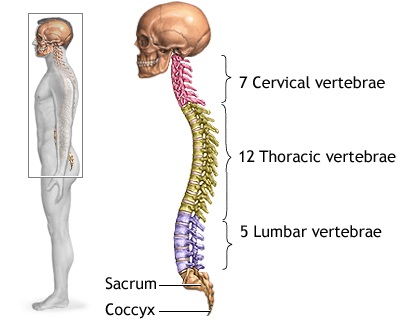Spinal injury
Contents
When to Contact a Medical Professional
The spinal cord contains the nerves that carry messages between your brain and body. The cord passes through your neck and back. A spinal cord injury is very serious because it can cause loss of movement (paralysis) below the site of the injury.
Causes
A spinal cord injury may be caused by:
- Bullet or stab wound
- Traumatic injury to the face, neck, head, chest, or back (for example, a car accident)
- Diving accident
- Electric shock
- Extreme twisting of the middle of the body
- Landing on the head during a sports injury
- Fall from a great height
Symptoms
Symptoms of a spinal cord injury may include:
- Head that is in an unusual position
- Numbness or tingling that spreads down an arm or leg
- Weakness
- Difficulty walking
- Paralysis (loss of movement) of arms or legs
- Loss of bladder or bowel control
- Shock (pale, clammy skin; bluish lips and fingernails; acting dazed or semiconscious)
- Lack of alertness (unconsciousness)
- Stiff neck, headache, or neck pain
First Aid
Never move anyone who you think may have a spinal injury, unless it is absolutely necessary. For example, if you need to get the person out of a burning car, or help them to breathe.
Keep the person absolutely still and safe until medical help arrives.
- Call the local emergency number, such as 911.
- Hold the person's head and neck in the position in which they were found. Do not try to straighten the neck. Do not allow the neck to bend or twist.
- Do not allow the person to get up and walk unassisted.
If the person is not alert or responding to you:
- Check the person's breathing and circulation. If necessary, begin rescue breathing and CPR.
- Do not tilt the head back when doing CPR. Do not do rescue breathing, do chest compressions only.
Do not roll the person over unless the person is vomiting or choking on blood, or you need to check for breathing. If you need to roll the person over:
- Have someone assist you.
- One person should be located at the person's head; the other at the person's side.
- Keep the person's head, neck, and back in line while you roll him or her onto one side.
DO NOT
- Do not bend, twist, or lift the person's head or body.
- Do not attempt to move the person before medical help arrives unless it is absolutely necessary.
- Do not remove a football helmet or pads if a spinal injury is suspected.
When to Contact a Medical Professional
Call your local emergency number (such as 911) if you think someone has a spinal cord injury. Do not move the person unless there is urgent danger.
Prevention
The following may lower your risk of spinal injury:
- Wear seat belts.
- Do not drink and drive.
- Do not dive into pools, lakes, rivers, and other bodies of water, particularly if you cannot determine the depth of the water or if the water is not clear.
- Do not tackle or dive into a person with your head.
Source: https://www.nlm.nih.gov/medlineplus/ency/article/000029.htm


